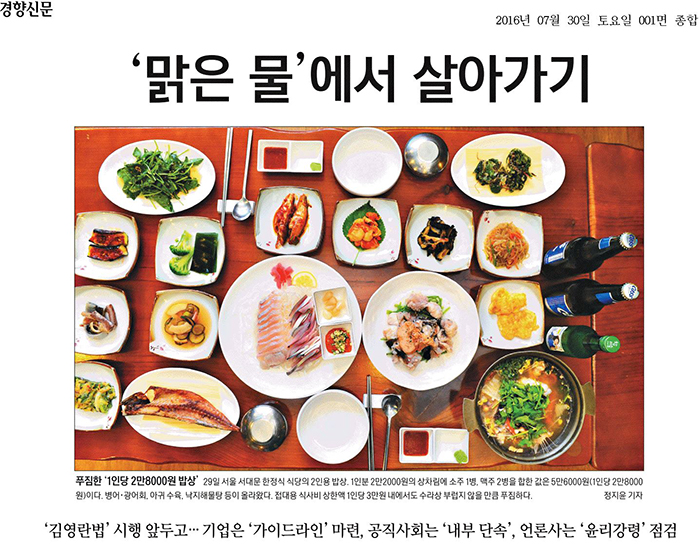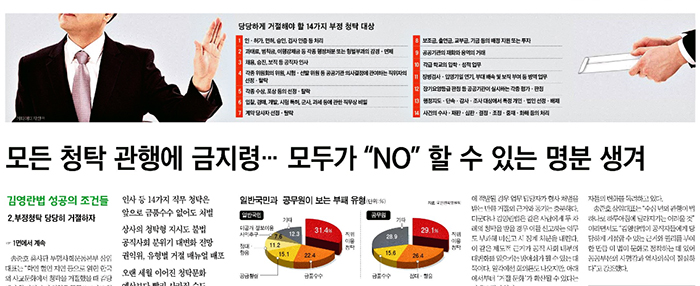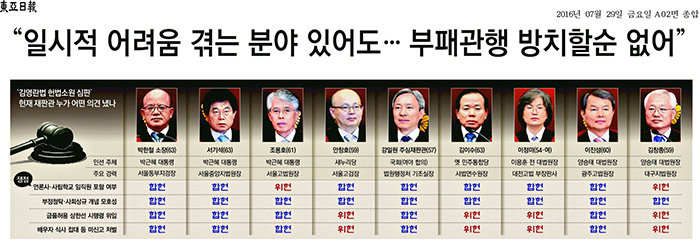
A new anti-graft law is expected to bring about major social changes. According to a July 30 article in the Kyunghyang Shinmun (above), restaurants are developing new menu items priced at exactly KRW 30,000, the new maximum for entertainment expenses, and firms are creating legal guidelines ahead of the law coming into effect on Sept. 28.
A new anti-graft law is shaking up Korean society, where gifts and expensive meals still constitute an important part of doing business. The law, also known as the Kim Young-ran Act, aims to end the cycle of corruption by putting a cap on the price of "gifts" and by criminalizing bribery and solicitation.
Korean society is characteristically family-oriented, with a strong sense of sympathy (온정주의, 溫情主義) being at the core of the senior-junior relationship. As such, giving gifts and sharing food on the basis of family ties, school relationships or home town, with a few favors thrown in, has regularly been seen as a natural part of any relationship. Over time though, small favors, like asking for an extra seat on a train, grew into corruption, leading toward solicitations for coveted jobs or promotions.
The Kim Young-ran Act is an attempt to put an end to this chain of corruption. According to the new law, public officials, private school teachers, and journalists can be arrested should they receive gifts in money or kind that exceeds KRW 1 million from one person, regardless if the compensation was related to the person's work. Persons convicted of accepting money or the monetary equivalent will be sentenced with jail time. The law also sets KRW 30,000, about USD 30, as the maximum value of one meal to which a person can be treated in work-related scenarios. The cap for gifts of any kind is KRW 50,000. Gifts given during personal events, like weddings or funerals, have a cap of KRW 100,000. The Kim Young-ran Act, so named because former Supreme Court Justice Kim Young-ran first proposed the legislation back in 2012, was passed by the National Assembly on March 3, 2015.

The Hankook Ilbo publishes an article on Aug. 3 about the new Kim Young-ran Act, outlining the ways in which the new law will help reform the habit of giving and receiving gifts in return for favors.
The passing of the law generated strong criticism from the Korean Bar Association, the Journalist Association of Korea, and from private school educators. These groups filed a petition with the Constitutional Court to contest the law, alleging, among other complaints, that the law restricted the freedom of the press and the right to equal treatment that are protected under the constitution. However, the Constitutional Court ruled against the petition, 7-2. The Court claimed that, "Education and media have great influence in our society, and as such, corruption in these sectors can have a greater ripple effect. It is for this reason that these sectors, much like the public sector, require more transparency. That the National Assembly chose these sectors as the first step in ending corruption, cannot be seen as arbitrary discrimination."
The Constitutional Court, in making its final ruling, said, "We cannot neglect the problem of bribery and corruption because of temporary difficulties we may experience in the process of enforcing the new law. We may impinge on the rights of the press and the private education sector, but the losses at the private level cannot be greater than the public benefits that will come our way with the passage of the Kim Young-ran Act."

On July 29, the Donga Ilbo reports that the ruling of the Constitutional Court on the passing of the Kim Young-ran Act is 'a timely move that aims to break the chain of corruption and makes society more transparent for all its citizens.'
With the new law going into effect on Sept. 28, it's expected to cause some major social shifts. Drinking sessions drawn out to second and third rounds, lavish business meals and complimentary rounds of golf will become things of the past, it is hoped. Giving expensive gifts to seniors at work or to business partners on national holidays will be banned by law. Not surprisingly, businessmen, as well as farmers and fishermen, have expressed complaints about the new law, as it will affect their business. They claim that from a sales standpoint, it is difficult to make gift boxes of meats, fruits or fish that don't exceed the KRW 50,000 limit. A number of restaurants are also struggling to create set menus that don't go over the KRW 30,000 maximum.
Despite these immediate problems however, public opinion is that the new law will help to eliminate corruption, reform society and increase economic efficiency. Many people believe that the corrupt practice of entertaining business clients needs to be put to an end, and that the Kim Young-ran Act will be a step in that direction.
People are hopeful that the new law will be a catalyst for change. In a more transparent society, the hope is that many irrational customs and habits will be corrected. In the short-term, some reduction in spending will be inevitable. On the bright side, however, spending associated with corruption will be reduced, as well.
With the new anti-graft law soon to go into effect, the custom of giving gifts and asking for favors will face a wave of drastic reform.
By Lee Hana
Korea.net Staff Writer
hlee10@korea.kr